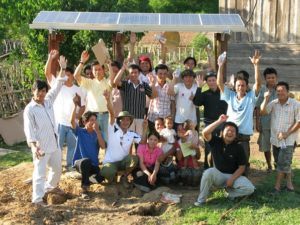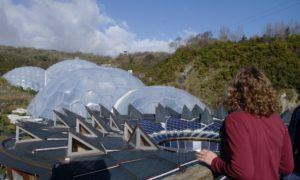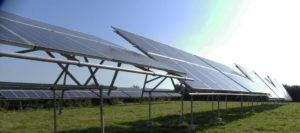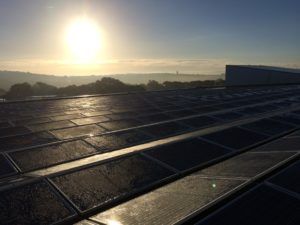Profile
Christine Coonick
Stomping round flooded fields in Warwickshire
Curriculum Vitae
-
Work History:
I started my career working for a bank, then a pensions & investments company, at which point I went travelling and became a self-employed property renovator in France. Since my degree I have worked only in the solar industry, working as an R&D engineer or technical sales engineer
-
Current Job:
My job title is Senior Consultant
-
Employer:
BRE National Solar Centre
-
My Work
I get the amazing job of pushing solar power technologies to their limits
-
Read more
Hello!
My name is Chris and I am an unlikely engineer. I had no plans to become an engineer, but after living on the side of a mountain in France with no water, electricity, or internet (?!?) I found I can be quite resourceful and find solutions to problems in the most difficult of situations.
I mainly became an engineer because I want to live a more sustainable life and to help others to do the same, and all though I am quite good at bodging stuff, generally if you want to make a career out of something (and be paid) you need to do things properly and have some kind of training for what you do. So at the age of 28 I decided to put myself (and my 2 year old daughter) through an Electrical Engineering foundation degree followed by a Masters in Renewable Energy and also became a qualified electrician for good measure.
I have been very fortunate in my career and have worked for lots of amazing people on lots of amazing projects, from developing a solar powered vaccine refrigerator for UNICEF, so kids all round the world can be vaccinated against horrible diseases, to empowering community energy groups in the UK to get solar powered projects up and running, generating low carbon electricity for the more vulnerable members of their community.
Right now I am working for the Building Research Establishment (BRE) National Solar Centre (NSC) – bit of a mouthful – and I am based at the Eden Project in Cornwall. The BRE are responsible for testing every part of the built environment (i.e. your home, school, shops etc.) to destruction to make sure that the materials and building products used to make a building a) do their job and b) do it well.
The small team that I work with deal specifically with solar power products and their performance. I get involved in research projects that look at different ways of better integrating solar power into the UK energy network through things like energy storage, control systems or changing the behaviour of consumers (people like you and me). I mainly work with new innovations, but I also still get to go out in the field and fix existing systems or design new ones.
-
My Typical Day: Trying to find reasons not to be sat at my desk
-
Read more
Luckily for me the word ‘typical’ doesn’t feature much in my day. Sure there are things that I do everyday, but they’re pretty mundane and have little to do with engineering.
The rest of my day is normally shaped around whatever project I am working on at that time. I spend a lot of time talking to people either about problems they have, or problems they think they may have in the future. All though solar power is not a new technology by any means, but the rapid increase in the amount of systems installed in the UK has meant that people like me have had to think on their feet as to how everything is going to work together safely and efficiently now and in the future. It is easy to think about one small system on a house in isolation, but thinking about 1 million systems all connected together through the electricity grid can be quite challenging.
When not problem solving or researching, I am designing. This is one of my favourite parts of my job. It starts with a site survey – which can involve crunching through reems of data on a spreadsheet analysing how, when and why people use energy, followed by an assessment of where a customer would like to install solar. This may be a boggy field in the middle of nowhere, hanging off the side of a skyscraper in central London, reviewing the drawings of a building that hasn’t even been built yet, or looking at your school roof.
When I have taken lots of measurements and photographs and talked to lots of people about what they want the system to do, then I go back to my office and start creating something that will meet their requirements. Luckily for me the components of a solar power system are modular, so generally it is a case of working out how many panels are required, or can fit in the space (or how much extra weight can the building support) and then selecting appropriate sized components that do the required job safely and within the limits of UK regulations. I then create a 3D computer model of the system and tweek it to get the optimum layout and component selection for the client.
Regardless of what my project is it always ends in a report. They can vary from a few pages presenting information to a client, others can be of epic proportions – research reports can easily be >100 pages in length. But no-one wants to read a dry technical report (especially not me!) so I always make sure that I put in plenty of images and infographics to illustrate the evidence that I have collected an the points I am making. Pictures make reading and writing reports more enjoyable.
-
What I'd do with the money
Run creative workshops for kids for the Wadebridge Bikelights Festival in October 2016
-
Read more
This will be the third year that Wadebridge has hosted the Bikelights Festival – a celebration of all things luminescent on wheels. Last year saw over 500 bikes adorned with lights take to the streets of Wadebridge.
This year the theme is the ‘Marvellous Machines’ and I’d like to use the money to buy materials for workshops for any children wanting to take part in the procession to create machines using recycled materials and adorned with LEDs that they can temporarily fix to their bikes for the event.
-
My Interview
-
How would you describe yourself in 3 words?
Creative, resourceful, determined
What's the best thing you've done in your career?
Designed an off-grid solar power system for a hospital on Likoma Island in the middle of lake Malawi so that it could provide care for patients 24 hours a day
What did you want to be after you left school?
An architect – until I found out how many years I needed to be at University
Were you ever in trouble at school?
I was once handcuffed to the desk by a visiting policeman when I was in year 3 for ‘indefinitely borrowing’ my friends toy that she had brought to school for show and tell.
If you weren't doing this job, what would you choose instead?
I’d run a juice bar in New York or become a teacher
Who is your favourite singer or band?
Massive Attack
What's your favourite food?
Cake or biscuits
What is the most fun thing you've done?
Snowboarded down a dune in the Sahara Desert
Tell us a joke.
What did the cheese say to its self in the mirror? Hallou-mi!
-





